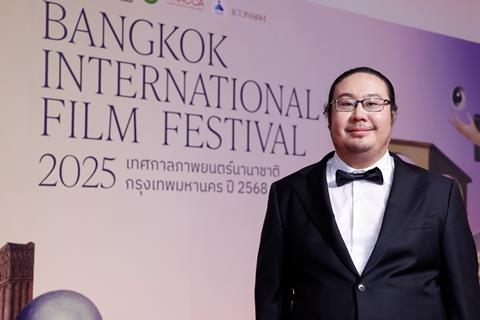
The Bangkok International Film Festival (BKKIFF) has made a grand return, hosting its first edition since 2009.
More than 200 films are being screened from September 27-October 15 across six locations in the Thai capital, making it the largest film festival in Thailand and Southeast Asian region for several years.
Last week, Thai action horror Death Whisperer 3 received its world premiere as the opening night gala screening on September 29, while the Talad Nang film market ran from October 1-4, both held at Iconsiam shopping complex.
As part of the film market, several awards were handed out on October 4, including the grand prize for Thailand’s Save The Cat and Indonesia’s Unholy; a runner-up prize for India’s Pech; and the French Embassy x Purin Award for Thailand’s Dalah Kali and Singapore’s Build-To-Order.
Screen spoke with BKKIFF festival director Donsaron Kovitvaniycha about resurrecting the event, a challenging date change and the state of the local film industry.
The last BKKIFF was held in 2009. What made the revival possible after such a long hiatus?
BKKIFF was held by Tourism Authority of Thailand (TAT) until 2009. After that, the festival disappeared for more than 15 years as the name could not be used until TAT decided to not keep the name. The new festival is different as it is organised by a temporary non-profit film society, unlike the one in the past organised directly by a government organisation.
After wrapping this year’s edition, we are going to rename and register this temporary film society as Thailand International Film Festival Society, which will also be responsible for other upcoming film activities as well.
Can you talk about the sources of funding?
The Ministry of Culture, the Department of Cultural Promotion, and Thailand Creative Culture Agency (THACCA) helped bring the festival back to life. We also have the support of the French Embassy and Goethe Institute, but without any corporate sponsors. The budget is almost 50% less than previously. It’s not as big, considering inflation that makes everything more expensive.
Why were the dates of the festival moved from January 2026 to September? And what impact has that had?
Personally, I prefer December or January as this time slot clashes less with other film festivals and gives us more time to prepare. The old BKKIFF was held in January for some years too. There are many reasons behind; it is not up to us. We had to reschedule it all of the sudden due to some red-tape issues that required us to spend the budget sooner. This impacted me and the team a lot as there was very little time to put everything together. Everyone was shocked when I told them. I can say it was very difficult and almost impossible.
What other challenges have you faced?
There hasn’t been any film festival of this scale in Thailand since 2009. BKKIFF takes place in six locations across Bangkok, compared to just one or two locations for the World Film Festival of Bangkok. There are also smaller film festivals organised by embassies and cultural institutions, such as Japanese film festival and Singapore film festival, which play 10-20 films in one location. Younger Thai audiences have never experienced a film festival of this scale. People may have no memories of how the old BKKIFF looked like in the past.
What is your approach as festival director for the revived BKKIFF?
When you revive a festival, it is like to have to start everything from scratch. I don’t do this festival to compete with others in the same region. As a festival director, I try to make this a space for everyone, to be a platform that connects people who love films from everywhere. The festival shows all genres of films, which the programming direction will be shaped up in the future so it can be a useful platform for everyone – especially film people in the region.
Cannes and Venice titles dominate the competition lineup. Are Thai audiences more receptive to high-profile foreign films?
Audiences choose what they want to watch. From Cannes, Bi Gan’s Resurrection and Kokuho, our closing film, sold out, while Kristen Stewart’s The Chronology Of Water and Lav Diaz’s Magellan sold well. Happy Hour [from a Ryusuke Hamaguchi retrospective] also sold well, just to name a few.
Opening film Death Whisperer 3 is one of only two films making a world premiere at BKKIFF. What does it say about the state of the Thai film industry?
We don’t have that many local titles produced each year. With the lack of support in film production in the past, the result is that we don’t have enough Thai films that can world premiere or even national premiere here. Some films have obligations to be released before the festival, and some films are scheduled for next year, and we can’t shift their release plans.
Next year, it could be better as the films supported by THACCA’s film fund will be finished, and we will have a variety of new Thai films to show. For example, Sompot Chidgasornpongse’s 9 Temples To Heaven, Aditya Assarat’s The Thonglor Kids, Phuttiphong Aroonpheng’s The Burning Giants, and Piyakan Bootprasert’s Onethong.
You’re a multi-hyphenate, from reporting and producing to curating for the World Film Festival of Bangkok.
I’ve done many things. I started as a film reporter for The Nation and then started to produce independent films [such as The Blue Hour, Malila: The Farewell Flower, Die Tomorrow and Arnold Is A Model Student]. However, film festival programming is something I want to do the most. But it is also the most difficult.















![[L-R]: Amanda Villavieja, Laia Casanovas, Yasmina Praderas](https://d1nslcd7m2225b.cloudfront.net/Pictures/274x183/6/4/1/1471641_pxl_20251224_103354743_618426_crop.jpg)






![[L-R]: Amanda Villavieja, Laia Casanovas, Yasmina Praderas](https://d1nslcd7m2225b.cloudfront.net/Pictures/100x67/6/4/1/1471641_pxl_20251224_103354743_618426_crop.jpg)


No comments yet